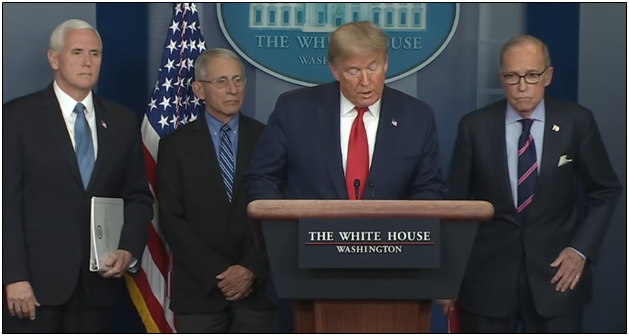The Senate will complete its bipartisan work on a $2 trillion economic relief legislative package today to incentivize Americans to stay home during the Chinese coronavirus outbreak response period, expected to last at least until April 12, Easter Sunday, when President Donald Trump says he’d like to reopen the country if it’s safe to do so. Swift passage is expected in the House, too.
The legislation, the subject of intense negotiations for seemingly endless days as the U.S. economy hangs by a thread, businesses cannot meet payroll and layoffs are beginning a huge run-up, comes amid continued uncertainty about the virus’ trajectory. On day 15 of the President’s national effort to slow the spread, the White House promises an update on where we expect the virus to be in the coming weeks.
To keep everyone sustainably in their homes while we wait out the virus, Congress has produced the largest piece of legislation in American history by a long shot. Fiscal hawks may wish to avert their eyes.
The bill will provide $367 billion for small businesses, $500 billion for critical industries, cities and states, $500 billion of additional checks to households that will come atop paychecks or unemployment benefits, $130 billion for hospitals to fight the outbreak, an additional $150 billion for state and local governments akin to the Obama stimulus of a decade ago, an additional $50 billion employee retention tax credit for companies, and the rest will go to a massive expansion of unemployment benefits that amount to paid sick leave for every person who had a job when the virus struck.
In the meantime, the Federal Reserve is being given $4 trillion of new liquidity firepower to address any contagion that enters the financial system during this national emergency.
This may be the first attempt to preempt a recession before it happened, preventing potentially hundreds of millions of job losses. If it works, it will be an economic miracle. It could prevent a depression.
In early April, we’ll get the first unemployment report since the country went on lockdown. Without this legislation, double digit unemployment was not out of the question. I doubt it will be a good report either way, although there may be a lapse in the data from when folks were getting laid off and what they were able to report in the survey. What this bill will do is ensure is that the April report that comes out first week of May will be much less bad than it would have been.
President Trump and Congress, if nothing else, can be proud that they are doing everything they can to save as many lives as possible from the virus. Keeping people sustainably in their homes is critical to that effort, and saving as many of the 30 million small businesses who cannot afford to close for a month or so as possible so that the economy has minimal disruption, are all important to protecting our health and our livelihoods in the longer term, too.
This has the potential to save tens of millions of jobs.
For Trump, buoyed by popular approval for his administration’s response to the virus, the economic safety net plan will in principle enable his administration and state governors to take as much time as they need to respond to the virus and save as many lives as possible.
Take your time, Mr. President. No rush.
Ultimately, it will be up to states to reopen what’s been closed locally. Things like air travel to certain destinations will be resolved federally. In tandem, parts of the economy will begin reopening when we proceed to the next phase.
Vast uncertainty has already been lifted by this deal, hopefully enabling more Americans to stay home and engage in social distancing.
Now, it will be up to the White House to make these benefits immediately available to the American people and businesses. Save them trips to the local unemployment office or bank. There should be a webpage or an app for many of these provisions. Applying should be easy or automatic in the case of tax provisions that Treasury can operate directly.
President Trump needs to tell every business directly that they need not lay anyone off. Really, businesses hold the fate of the recession in their hands. If every one of them take advantage of what’s in this legislation, not one person will need to have lost his or her job in the coronavirus outbreak. Continuity in business operations can be provided for.
What might have been a long, deep recession can be a shallow one or not one at all.
That appears to be the plan, anyway. Either way, nobody can say President Trump and Congress did not take this emergency seriously in what they were asking every American to do by staying home and not working. They found a way to sustain us all while the virus response takes place.
Now the job will be to ensure that these measures are actually temporary and end once the economic calamity caused by the virus passes. Stay tuned.
Robert Romano is the Vice President of Public Policy at Americans for Limited Government.







